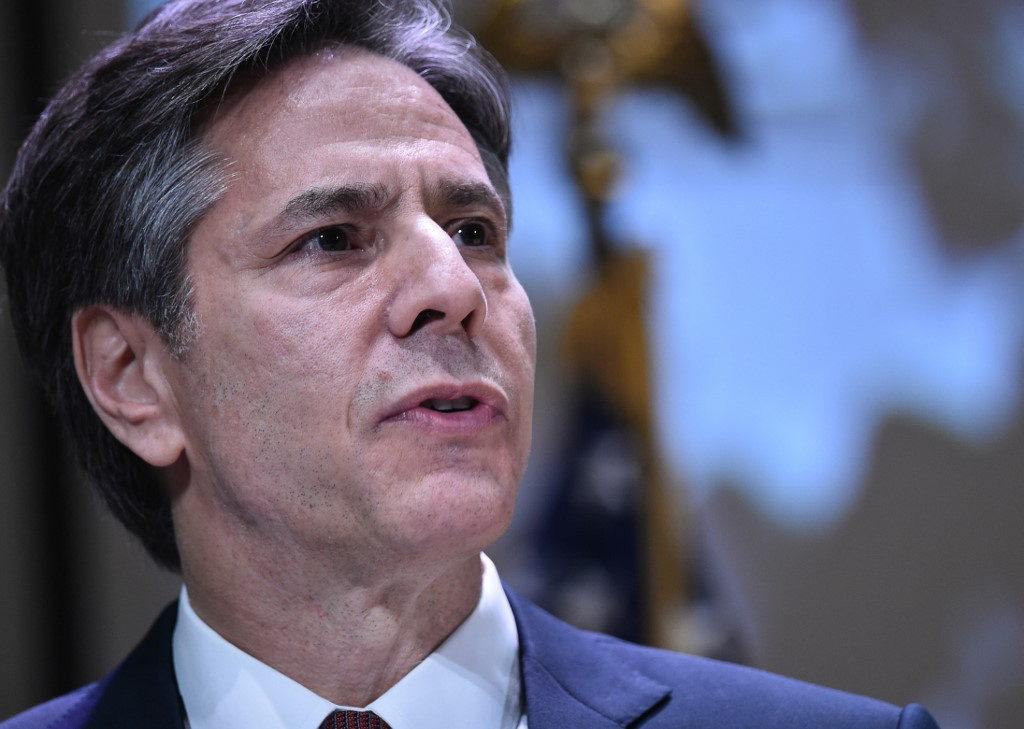Popular Reads
Top Results
Can't find what you're looking for?
View all search resultsPopular Reads
Top Results
Can't find what you're looking for?
View all search resultsQuad members oppose China's attempts to alter status quo by force
Speaking to reporters after an online meeting of the Quad group, Japanese Foreign Minister Toshimitsu Motegi said the ministers also affirmed the need to swiftly restore democracy in Myanmar, where the national military staged a coup on Feb. 1.
Change text size
Gift Premium Articles
to Anyone
 In this file photo taken on June 20, 2016 US Deputy Secretary of State Antony Blinken takes part in a naturalization ceremony on World Refugee Day in recognition of those who have come to the US with refugee or asylum seeker status, at the US Holocaust Museum in Washington, DC. President-elect Joe Biden plans to nominate veteran diplomat Antony Blinken as his secretary of state, a decision likely to signal a return to multilateralism after Donald Trump's shunning of traditional allies, US media reported November 22, 2020. (Agence France Presse/Mandel Ngan)
In this file photo taken on June 20, 2016 US Deputy Secretary of State Antony Blinken takes part in a naturalization ceremony on World Refugee Day in recognition of those who have come to the US with refugee or asylum seeker status, at the US Holocaust Museum in Washington, DC. President-elect Joe Biden plans to nominate veteran diplomat Antony Blinken as his secretary of state, a decision likely to signal a return to multilateralism after Donald Trump's shunning of traditional allies, US media reported November 22, 2020. (Agence France Presse/Mandel Ngan)
T
he foreign ministers of Japan, the United States, Australia and India agreed Thursday they "strongly" oppose any attempts by China to alter the status quo in the Indo-Pacific region by force, in their first such meeting since the change of the U.S. administration.
Speaking to reporters after an online meeting of the Quad group, Japanese Foreign Minister Toshimitsu Motegi said the ministers also affirmed the need to swiftly restore democracy in Myanmar, where the national military staged a coup on Feb. 1.
"We had candid talks about cooperation toward the free and open Indo-Pacific and on regional and global issues," including responses to the novel coronavirus pandemic and climate change, Motegi said.
The four ministers confirmed the importance of advancing a free and open Indo-Pacific through deeper engagement and cooperation with more countries, including the Association of Southeast Asian Nations, the Pacific islands and European countries, according to the Japanese Foreign Ministry.
The U.S. State Department said that Secretary of State Antony Blinken and the other participants discussed, among other issues, "the urgent need to restore the democratically elected government" in Myanmar and "the priority of strengthening democratic resilience in the broader region."
They reiterated their commitment to hold a Quad meeting at least annually at the ministerial level and on a regular basis at senior and working levels to strengthen cooperation toward a free and open Indo-Pacific region, including support for freedom of navigation and territorial integrity, the department added in a press release.
Regarding a possible Quad summit meeting, whose planning has been under way according to a source, Motegi said no schedule has been set, although the ministers agree on the importance of cooperation at the leaders' level.
The grouping of the four regional maritime democracies collectively known as the Quad is widely considered as a united front in response to China's rise, including its assertiveness in the East and South China seas. India and China are at loggerheads over a disputed border region in the Himalayas.
Motegi said he conveyed Japan's serious concerns about China's new law implemented on Feb. 1 that explicitly allows the Chinese coast guard to use weapons against foreign ships that it sees as illegally entering its waters.
Its coast guard vessels were spotted near the Japanese-controlled Senkaku Islands in the East China Sea, claimed by Beijing, for a record number of days last year and have entered Japan's territorial waters near the uninhabited islets several times since the law took effect.
The legislation sparked worries that Beijing could target Japanese vessels navigating around the islands.
The meeting, also attended by Australian Foreign Minister Marise Payne and Indian External Affairs Minister Subrahmanyam Jaishankar, was the third such gathering among the four countries' foreign ministers following the first in New York in September 2019 and the second in Tokyo in October last year.
It was also the first such talks since the inauguration of U.S. President Joe Biden on Jan. 20.
Japan's top government spokesman Katsunobu Kato has welcomed the U.S. move to host the quadrilateral meeting, saying it "demonstrates the Biden administration's strong commitment to a free and open Indo-Pacific and to the Japan-U.S.-Australia-India framework."
Amid China's growing clout in the region, efforts have gained momentum in recent years to renew the grouping, formally known as the Quadrilateral Security Dialogue.
While the four countries have held foreign ministerial meetings and joint military exercises, questions remain as to whether they can fully align themselves to speak with one voice on regional issues and whether they can institutionalize the framework.
Pundits say an overemphasis on the Quad may raise concern about the possible diminishing of traditional bilateral alliances such as between the United States and South Korea, which is apparently reluctant to join such a grouping as it could draw the ire of China, while the members of the ASEAN could also feel shunned.









